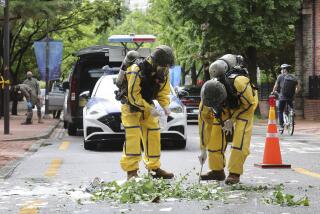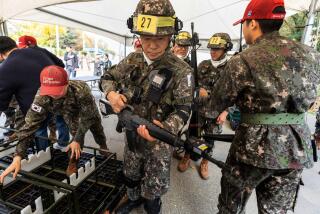In South Korea, a small island town takes on the navy
- Share via
JEJU ISLAND, South Korea -- To the South Korean military, this picturesque island is the perfect place to build a naval base: a strategic location guarding the country’s southern flank from possible invasion. To its residents, its small-town feel, harbor and coral reefs make it close to perfect just the way it is.
The conflict between the two visions has turned into a South Korean David and Goliath story, with Mayor Kang Dong-kyun of the town of Gangjeong leading the majority of its 1,930 people in fighting the giant.
For years, Kang was a hardworking farmer who minded his own business, tending to his tangerine trees in the town where he was born. But since becoming mayor in 2007, Kang has rallied residents, who wage almost-daily protests.
Early this year, hundreds of protesters flew here as the navy and construction workers started blowing up coastal rocks. Several dozen demonstrators were hauled off to the police station.
“How can the military, which should guarantee the people’s peace and livelihood, ruin it so easily for Gangjeong people?” said Kang.
The provincial governor also has asked the military to halt construction; the navy responded that it plans to finish building the base in 2015, as scheduled.
Military officials say building a naval base on a site with a well-sheltered harbor will help protect the nation from intrusions by Japan, China or even North Korea. PresidentLee Myung-bak said in a speech in late February that the project was crucial to the country’s security.
The navy’s website includes an explanation of the base’s importance to national security. “The sea waters south of Jeju are like an unfenced yard,” it said, andSouth Korea’sportion “definitely needs protection.”
International military analysts say the 700-square-mile island is a crucial piece of defensive real estate.
“Jeju’s curse is its strategic location between South Korea and Japan,” Korea Policy Institute fellow Anders Riel Muller wrote on the organization’s website. “It is only 300 miles from the Chinese mainland and Shanghai.”
But residents say the project will wreak both economic and environmental disaster. The new base will subsume the picturesque harbor, and its security perimeter will shut out fishermen and women who for generations have dived for abalone, sea cucumber and brown seaweed. The 125-acre naval base would also cause significant damage to miles of coral reef offshore, they say, endangering local species such as the red-clawed crab.
The presence of 8,000 military personnel would turn their 400-year-old village, which is surrounded by three UNESCO World Natural Heritage sites, into a busy navy town. Residents worry about bars and prostitution.
Led by Kang, residents have become persistent antidevelopment activists. In good weather, they occupy construction cranes to halt work. They lie down in groups so engineers cannot blast away the mountains of basalt rocks along the coast. In the winter, some even jumped into the frigid water to halt a barge delivering construction materials. They have accumulated more than $250,000 in fines.
Last summer, Kang spent three months in jail on charges of “interrupting business.” But he remains unbowed. The day he was released from jail, he returned to his protests.
Residents point to studies that show Gangjeong is a poor choice for the base because of its jagged coastline. Some experts second those claims.
“This region is not suitable to be turned into a base,” said Je Jong-gil, an oceanographer and director of the City and Nature Institute in Seoul. “It has tremendous ecological value. It must be preserved.”
The town’s cause received a boost from American actor and director Robert Redford, who argued against the project on the website of the environmental magazine OnEarth.
“Imagine dropping 57 cement caissons, each one the size of a four-story house, on miles of beach and soft coral reef,” he wrote. “It would destroy the marine ecosystem.”
Still, a few Gangjeong residents favor the project, which they say will bring jobs. The navy says residents voted in favor of hosting the base in 2007. Villagers say that vote was undemocratic. It should be discounted, Kang said; only 87 people voted.
And the result was so unpopular that residents demanded the resignation of the mayor who supervised it. Weeks later, with Kang as the new mayor, they voted again. This time 680 people voted, and they rejected the project.
The rift has divided families.
“My family has lived here for generations; we celebrated everything together,” said Kang Sung-won, a 79-year-old farmer. “Now, when we see each other coming, we turn away and take a different route. We don’t even shop at the same supermarket.”
The mayor says the important thing is not to be pushed around by the military.
“It’s not that we don’t understand the importance of the national security,” he said. “But we have to ask the right questions: Why here in Gangjeong?”
Choi is a news assistant in The Times’ Seoul bureau.
More to Read
Sign up for Essential California
The most important California stories and recommendations in your inbox every morning.
You may occasionally receive promotional content from the Los Angeles Times.










